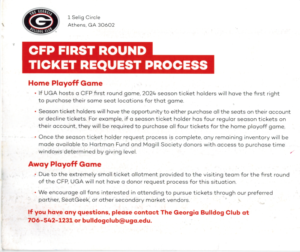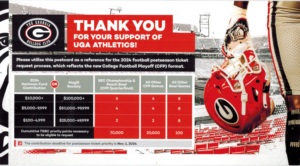There are many Kirby-isms that have become lore among Georgia fans. “You’re either elite or you’re not.” “Keep chopping wood.” But one lesser-repeated line from a 2022 press conference might rise above them all to define Kirby Smart’s Georgia program.
“We built a program to be sustained.”
Following the 2021 national title season, Smart asserted during the 2022 SEC Media Days that his program wasn’t a flash in the pan. “We didn’t build this program on hoping for one-year wonders. We built a program to be sustained. This program was built to be here for a long time.”
Smart didn’t waste time backing up his words. The Bulldogs repeated as national champions and followed up with a top three finish in 2023. Now entering the expanded playoff era, Seth Emerson reflects on that sustainability when he concludes that “no college football team in America seems better positioned for the new era than Georgia.”
There’s no need to rehash the personnel and program strengths that have Georgia near or at the top of every preseason poll. (Though they should never be taken for granted either.) Georgia isn’t scrambling to find a quarterback or guys who can run, catch, block, or tackle. No team is perfect, and but Georgia’s concerns are now first-world problems at the margins of performance and mental toughness. Even as Smart sustains the program at a high level, that success at the margins can determine which seasons end with titles and which come up just short. It’s worth spending a few lines on what might threaten Georgia’s high level of success in the 2024 season.
You know what they say about “assume”
Emerson identifies a few of those threats, and the first is complacency or entitlement. The season’s slogan “assume nothing” is the response. Georgia might be set up for long-term success, but it has to be earned every year from the ground up. That’s been a consistent message from Smart even after a championship. Coming off a season that fell short of a national or SEC title, there is no reason for anyone to be satisfied or complacent. TE coach Todd Hartley illustrates how the ingrained focus on process helps to put the “assume nothing” slogan into practical terms. “When you’re not thinking about the outcomes and you’re focusing on the process, you don’t even think about (everything else)” – the playoff, the SEC, or the 12-game grind. If each game is a new test of the team’s preparation and standard of execution, there’s no point in looking down the road or being satisfied with the last result.
What do you do well?
“Assume nothing” goes beyond mindset to execution from week to week. We take certain things as givens entering the season. A Kirby Smart team will always have a good defense. The Dawgs are loaded on the edge. Carson Beck has command of the offense. There is veteran experience on the defensive line, and the offensive line should contend for the Joe Moore Award. The key to any successful season is to make sure the strengths perform like strengths while improving weaknesses. What happens when our assumptions are tested?
The offense, as good as it was all regular season, hit a wall against Alabama, literally and figuratively, because it couldn’t run the ball. That shouldn’t have been a problem in that game, but it was, and now Georgia has less experience at tailback, banking on Florida transfer Trevor Etienne and a host of sophomores and freshmen.
That observation hits on two areas. Georgia’s offensive line is touted as a strength, and it must consistently play like one. Alabama was able to control the line of scrimmage with just a four-man rush, and things only got worse once Mims was out of the game. Bama’s defensive front was talented and better than any Georgia saw in 2023, but the challenges for the offensive line are more likely to be on that end of the spectrum in 2024 given the quality of teams Georgia must face.
There’s a larger issue: explosiveness. Alabama made a coverage adjustment after Georgia’s opening scoring drive, and – aside from a 50-yard pass to Arian Smith in the 3rd quarter – largely bottled up the Bulldog offense. Yes, Georgia struggled to run the ball, but the combination of Alabama’s effective pass rush and split safeties controlling the middle of the field took away big plays in the passing game. It mattered that Bowers and McConkey, two of Georgia’s most explosive receiving threats, were hampered by injuries, and their limitations gave Alabama confidence in their adjustment.
Here’s the thing, though – Bowers, McConkey, and in total four of the top five receivers from 2023 are gone. That explosiveness will have to come from elsewhere. Dillon Bell emerged as a playmaker late in the season. We know all about Arian Smith’s speed, but can he be more than the guy who gets targeted deep two or three times a game? Dominick Lovett has been a productive receiver for two SEC programs and should have a major role. There is depth at tight end. It’s not just talent. Beck clearly had a comfort level with Bowers and McConkey. Developing that connection and instinct with a new group of go-to receivers takes work and time. Scattered practice and scrimmage reports suggest that work might still be ongoing.
Finishing the season
You’ve heard plenty about Georgia’s schedule, but it’s unusual to see a valid point that doesn’t relate to Alabama or Texas:
The part that on paper gives Smart the most heartburn is November: Florida isn’t expected to be very good, but it’s still the Cocktail Party, and then Georgia has to turn around and go to Ole Miss. Then a week after that is a home game against Tennessee, which could be problematic. It’s a month — and a season — where Georgia’s depth will be tested.
That’s not to disrespect the challenge of playing at Texas and Alabama or the need to stay focused week to week against opponents like Clemson, Kentucky, and Auburn. But think about the state of Georgia’s team last November. Bowers and McConkey were dinged up. Dumas-Johnson had a broken arm, and, as we learned later, Mondon played injured the entire season. Mims was never quite at full strength after ankle surgery and took himself out of the SEC championship game. Every team is banged up to some extent at the end of the season, and Georgia wasn’t spared. The schedule was forgiving enough for the Bulldogs to navigate the regular season unscathed, but the wear and tear of even a lesser schedule mattered in Atlanta.
Smart earlier this month addressed concerns with his team’s depth, and you’d expect those issues to begin showing up later in the season. Late-season depth concerns matter more now for teams with national title aspirations: with a potential for 16 or even 17 games due to the expanded playoff, over half of the national champion’s games will occur after November 1st. If Georgia emerges from its difficult regular season as a championship contender, in what shape will the team be entering the postseason?
 How tickets for a home CFP game will work
How tickets for a home CFP game will work



 Dawg Media
Dawg Media